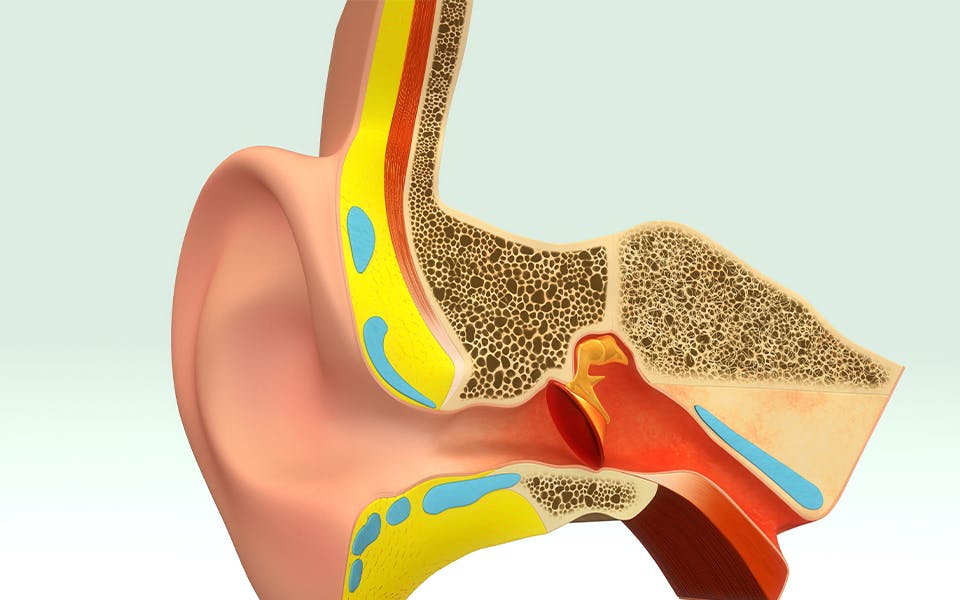Your ears are uniquely shaped to collect and send sounds from your outer ear to your inner ear. The hearing process has several steps that use different parts of your auditory system to interpret your listening environment.
How Sound Travels Through Your Ears
Outer ear: Ear shape affects your sound perception. Your outer ear includes the exterior structure called the pinna and your ear canal. As sound waves travel through the air, those structures collect and funnel them into your middle ear.
Middle ear: Your middle ear includes your tympanic membrane, or eardrum, and three tiny bones called the ossicles. Sound waves are changed into vibrations once they encounter your eardrum. Those vibrations are amplified by the ossicles and sent to your inner ear.
Inner ear: The cochlea is a snail-shaped structure in your inner ear that has three fluid-filled chambers. Sound vibrations create ripples in the fluid, stimulating tiny hair-like cells called stereocilia. Those structures convert the vibrations into electrical signals.
Sounds and Your Auditory Nervous System
Once sound vibrations are changed into electrical signals, they travel along your auditory nerve, which connects your inner ear to your brain. The lower part of your brain stem sends the electrical signals to your auditory cortex where they’re interpreted and “heard.”
Your brain and ears work in tandem to support auditory perception, which is your ability to identify and interpret sounds. Hearing contributes to your spatial awareness and your understanding of your surroundings.
How to Prevent Hearing Loss
Your hearing can be damaged by short- or long-term exposure to loud sounds over 85 decibels. Those noises could be produced by lawnmowers, heavy traffic, jackhammers, gunfire, fireworks, sporting events and jet engines.
Other common causes of hearing loss include excess earwax, age-related hearing loss, ear infections, head or ear injuries and ototoxic drugs.
These preventative measures can help you protect your hearing:
- Be aware of and limit your exposure to loud sounds.
- Wear hearing protection, like types of earplugs and over-ear headphones, in noisy environments.
- Only listen through earbuds at 60% volume for 60 minutes at a time.
- Check your medication for ototoxic side effects.
- Don’t stick objects in your ears.
- Visit an audiologist to get your hearing tested.
The Importance of Annual Hearing Tests for Hearing Aid Users
You likely received a hearing screening as a child when you started school. But if that was the last time you had your hearing checked, it’s time to consider having an annual hearing test, especially if you’re currently using a hearing aid.
With the natural progression of aging, your hearing capabilities can change. For individuals who rely on hearing aids, these changes can directly impact the effectiveness of your device. That’s why it’s vital to maintain regular check-ups to preserve your remaining auditory function and keep your hearing aid functioning optimally. Yearly hearing testing helps to establish a benchmark for your hearing capabilities, which can be compared with future test results.
A typical hearing test involves listening to sounds and tones at different volumes and pitches to identify your type and degree of hearing loss. Based on those results, your audiologist will not only be able to prescribe an effective treatment plan but also adjust the programming of your hearing aid to meet your evolving needs. This ensures your hearing aid remains efficient and serves you best.
The evaluation isn’t just about maintaining the performance of your hearing aid. It also helps your doctor identify the cause of any changes in your hearing. This could be something as simple as earwax buildup. In such cases, your hearing aid prescription may need adjustments. In other words, regular hearing tests for hearing aid users play a crucial role in preserving your hearing health and ensuring your device is always fine-tuned to your specific needs.
Hearing Associates is committed to providing audiology and hearing health services to northern Iowa and southern Minnesota. Call 888-760-2032 or schedule your appointment online.


